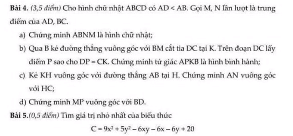
Hãy nhập câu hỏi của bạn vào đây, nếu là tài khoản VIP, bạn sẽ được ưu tiên trả lời.



\(a,\Leftrightarrow\left(9x^2-18x+9\right)+\left(y^2-6y+9\right)+\left(2z^2+4z+2\right)=0\\ \Leftrightarrow9\left(x-1\right)^2+\left(y-3\right)^2+2\left(z+1\right)^2=0\\ \Leftrightarrow\left\{{}\begin{matrix}x=1\\y=3\\z=-1\end{matrix}\right.\)
\(b,\Leftrightarrow\left(4x^2+8xy+4y^2\right)+\left(x^2-2x+1\right)+\left(y^2+2y+1\right)=0\\ \Leftrightarrow4\left(x+y\right)^2+\left(x-1\right)^2+\left(y+1\right)^2=0\\ \Leftrightarrow\left\{{}\begin{matrix}x=-y\\x=1\\y=-1\end{matrix}\right.\Leftrightarrow\left\{{}\begin{matrix}x=1\\y=-1\end{matrix}\right.\)
\(c,\Leftrightarrow\left(4x^2+4xy+y^2\right)+\left(x^2-2x+1\right)+\left(y^2+4y+4\right)=0\\ \Leftrightarrow\left(2x+y\right)^2+\left(x-1\right)^2+\left(y+2\right)^2=0\\ \Leftrightarrow\left\{{}\begin{matrix}2x=-y\\x=1\\y=-2\end{matrix}\right.\Leftrightarrow\left\{{}\begin{matrix}x=1\\y=-2\end{matrix}\right.\)
a,9x^2+y^2+2z^2−18x+4z−6y+20=0
⇔9(x−1)^2+(y−3)^2+2(z+1)^2=0
⇔x=1;y=3;z=−1
b,5x^2+5y^2+8xy+2y−2x+2=0
⇔4(x+y)2+(x−1)2+(y+1)2=0
⇔x=−y;x=1y=−1⇔x=1y=−1
c,5x^2+2y^2+4xy−2x+4y+5=0
⇔(2x+y)^2+(x−1)^2+(y+2)^2=0
⇔2x=−y;x=1;y=−2
⇔x=1;y=−2
d,x^2+4y^2+z^2=2x+12y−4z−14
⇔(x−1)^2+(2y−3)^2+(z+2)^2=0
⇔x=1;y=3/2;z=−2
e: Ta có: x^2−6x+y2+4y+2=0
⇔x^2−6x+9+y^2+4y+4−11=0
⇔(x−3)^2+(y+2)^2=11
Dấu '=' xảy ra khi x=3 và y=-2

\(9x^2-6x+20\)
\(=9x^2-6x+1+19\)
\(=\left(3x-1\right)^2+19>0\forall x\)

a: Xét tứ giác ABNM có
AM//BN
AM=BN
Do đó: ABNM là hình bình hành
mà \(\widehat{MAB}=90^0\)
nên ABNM là hình chữ nhật

Bài 1:
a)\(3x^2+5x+2\)
\(=3\left(x+\frac{5}{6}\right)^2-\frac{1}{12}\ge-\frac{1}{12}\)
Dấu = khi \(x=-\frac{5}{6}\)
b)\(4x^2+y^2-2xy+7x-4y+10\)
tương tự có Min=\(\frac{21}{4}\Leftrightarrow x=-\frac{1}{2};y=\frac{3}{2}\)
Câu 2: ở đây Câu hỏi của Phạm Thùy Linh - Toán lớp 8 | Học trực tuyến

a: =>2x^2-2x+2x-2-2x^2-x-4x-2=0
=>-5x-4=0
=>x=-4/5
b: =>6x^2-9x+2x-3-6x^2-12x=16
=>-19x=19
=>x=-1
c: =>48x^2-12x-20x+5+3x-48x^2-7+112x=81
=>83x=83
=>x=1

a: \(M=\dfrac{2\left(1-3x\right)\left(1+3x\right)}{3x\left(x+2\right)}\cdot\dfrac{3x}{2\left(1-3x\right)}=\dfrac{3x+1}{x+2}\)

\(a,\Rightarrow\left(x-2000\right)\left(5x-1\right)=0\Rightarrow\left[{}\begin{matrix}x=2000\\x=\dfrac{1}{5}\end{matrix}\right.\\ b,\Rightarrow x\left(x^2-13\right)=0\Rightarrow\left[{}\begin{matrix}x=0\\x=\sqrt{13}\\x=-\sqrt{13}\end{matrix}\right.\\ c,\Rightarrow3x\left(x-2\right)=0\Rightarrow\left[{}\begin{matrix}x=0\\x=2\end{matrix}\right.\\ d,\Rightarrow\left(x-5\right)\left(x+3\right)=0\Rightarrow\left[{}\begin{matrix}x=5\\x=-3\end{matrix}\right.\\ e,\Rightarrow\left(3x-2\right)\left(3x+2\right)=0\Rightarrow\left[{}\begin{matrix}x=\dfrac{2}{3}\\x=-\dfrac{2}{3}\end{matrix}\right.\)
